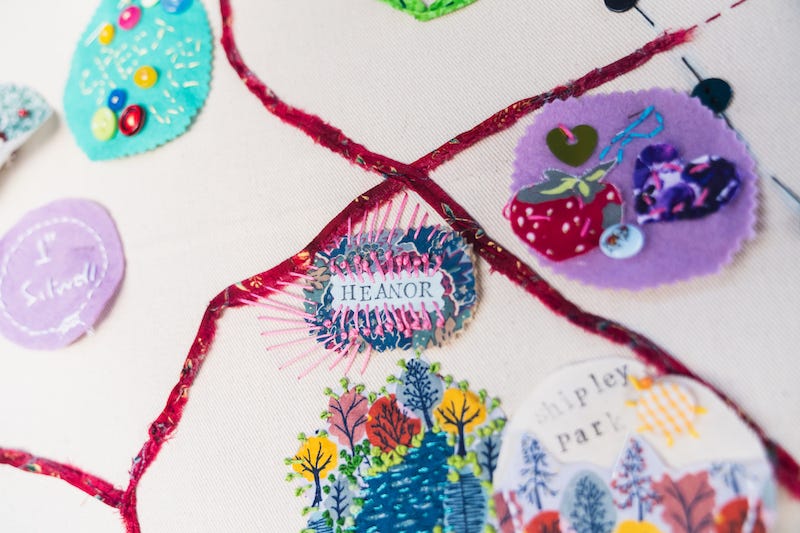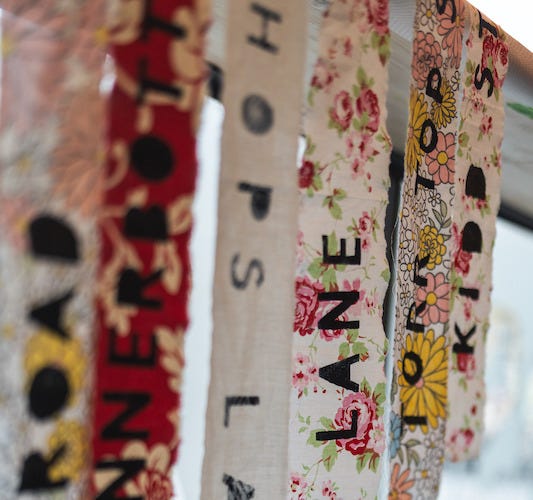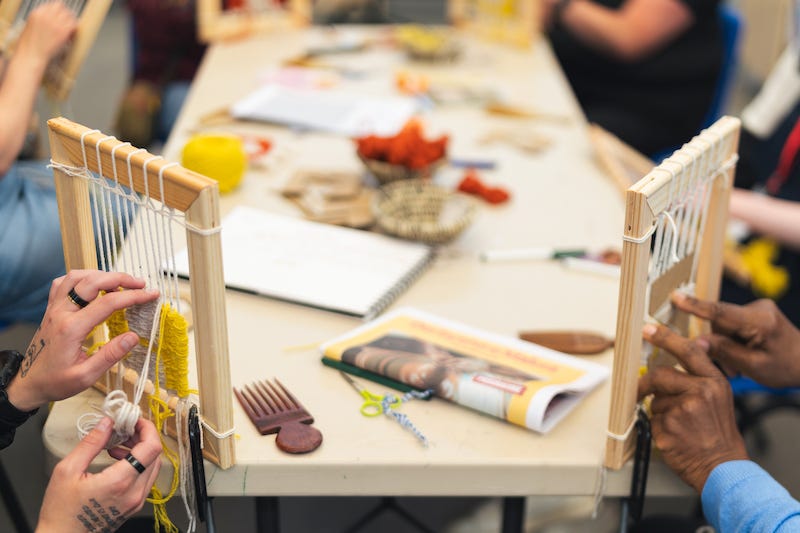Groundhog Day
Still trying to make the economic case for arts and culture including large-scale festivals
Welcome to the thirteenth edition of my monthly newsletter, all about arts festivals. A very warm hello to my new subscribers and to all my existing subscribers. Here in the UK, Spring has well and truly sprung with a mini heatwave marking the start of festival season.
I’ve been working in the arts, culture, heritage and tourism sectors for over thirty years, and yet here we are again with a newly published report stating the value of arts and culture to the UK economy, using major festivals as some of the case study evidence. So, why have we still not won the argument with politicians and the public about the value of these sectors in our daily lives? That’s a whole thesis which I won’t attempt to address here, though academic and author Justin O’Connor has tackled this thorny subject in his book, ‘Culture is not an industry: Reclaiming art and culture for the common good’ (fyi, I’m not on commission!).
I’m referring to the new Arts Council England (ACE) commissioned report by the Centre for Economics and Business Research with the sexy title, ‘Spillover impacts in the publicly funded arts and culture sector’ – clearly targeting national politicians and the Treasury Department in the build-up to the Government’s Comprehensive Spending Review.1 The report highlights three biennial festivals – Manchester International Festival (MIF), Liverpool Biennial and the Lumiere Festival in Durham as examples of economic growth through cultural engagement, all in receipt of ACE investment. The report covers their economic impact, increasing visitor figures edition on edition, high value visitors, job creation, local spend, business engagement, skills development and their role in contributing to urban regeneration. The positive return on investment is clear to see as MIF23 generated a total revenue of £39.2m, with £26.4m directly spent within Manchester; Liverpool Biennial 2023 edition’s total economic impact amounted to £24.3m with £13.2m generated directly from visitor activity within the wider Liverpool economy; and since its inception in 2009, Lumiere has generated more than £43m in local economic impact in Durham.2
Once again, this messaging disconnects the wider benefits that festivals, arts and culture in general, and specifically artists contribute to our lives and as a society. I totally understand why, I’ve commissioned enough economic impact research reports, including to make the case for the initial public sector investment in Manchester International Festival, as well as to evaluate the first edition, and twice for Liverpool Biennial 2008 and 2016 editions. Edinburgh International Festival and Edinburgh Festival Fringe were very vocal in sharing the economic impact they deliver for Edinburgh and Scotland in their lobbying for public sector investment prior to Creative Scotland financial settlements.
Yet despite the large figures quoted in the above report, all festivals, including major biennial festivals, live precarious lives, from one edition to the next. Teams expand and contract quickly, and there are always some core staff that leave because they simply cannot face another festival cycle resulting in the loss of institutional memory.
Of course, it’s not that as a sector we don’t talk about the benefits in terms of social value, soft power, inclusivity, supporting children and young people, creative health, placemaking, environmental sustainability etc., etc. We do. We produce endless research and evaluation reports to make all these cases repeatedly. Annual and biennial festivals in receipt of public sector investment now must also demonstrate economic, social and environmental year-round benefits. And for the large-scale city-based festivals, city region agencies have high expectations about what such festivals will deliver, especially in terms of supporting wider political agendas. For example, we launched the inaugural Manchester International Festival in New York straight after the programme launch in Manchester (three months before the first festival!). Why? To support the city’s relationship building with American businesses, including airlines as part of multi-agency work to secure airline route development into Manchester Airport. And yet, festivals and the wider arts and culture sector are still not seen as essential to policy makers at a national level. I do wonder if other sectors, like fishing, spend so much time and money justifying their existence and need for ongoing investment.
It's refreshing to see in Dr Beatriz Garcia’s recent paper titled UK Cities of Culture: Stakeholder Interviews with runner-up applicants that city representatives understand the transformative benefits of bidding for major cultural accolades and that the process really did deliver lasting legacies, even when they did not win. The most common types of legacy identified by the stakeholders were:
Placing culture at the centre of city development;
Raised ambition and a can-do attitude across the city;
Positioning/repositioning the city;
A greater (or a new) national and international outlook;
Cross-sectoral working/learning to work together;
Adaptability for the culture sector/new skills;
Engaging citizens in new/valuable ways.
Whilst many of the cities would not bid again due to lack of capacity and resources, it has given them more confidence to bid for other international accolades, e.g. UNESCO Creative Cities Network. I remember supporting Norwich in its bid to be the first UK City of Culture (awarded to Derry/Londonderry in 2013), and the city quickly and successfully switched to bid to become a UNESCO City of Literature, something it would not have attempted had it not gone through the UK City of Culture bidding process.
Dr. Garcia has also worked extensively with the European Capital of Culture programme as a consultant and researcher demonstrating the impact and value of the initiative which celebrates its 40th anniversary this year. She is also Chair of Walk the Plank who have worked with numerous European cities through the European Capitals of Culture programme, over recent decades. I’ve just read Walk the Plank Co-Founder and Creative Producer Liz Pugh’s blog reflecting on their work with European cities at the bidding stage, in delivery of European Capital of Culture programmes and beyond. This highlighted for me why festivals, and these year-long events, are so important, especially now, in shining a light on places, people and current issues, and that we are all part of an interconnected global community.
And you can’t put an economic value on that.
UK News
Equity union insists that performers at this year’s Cambridge Shakespeare Festival must be engaged as ‘workers’ not volunteers and therefore they must be paid.
Sho Shibata, Director of Outdoor Arts UK shares his thoughts on how the outdoor arts are a gateway to diverse audiences.
London Design Festival will benefit from increased investment from the London Mayor’s office.
Culture Counts explain how the Impact and Insight Toolkit can support festival evaluation.
Job opportunities and personnel changes
Hull’s Freedom Festival Arts Trust is looking for an Executive Director.
London’s Dance Umbrella is recruiting for an Assistant Producer for its international dance festival.
Waterperry Opera Festival in Oxfordshire has a number of opportunities available including CEO, Orchestra Manager and Marketing Internship.
Wigtown Book Festival Director, Adrian Turpin steps down after 20 years.
Liverpool Biennial announces new Chair, Cathryn Wright.
Phill Fairhurst is the new Festival Director at Hand in Hand Festival, the UK and Ireland’s biennial LGBTQ+ choir festival, with the next one to be held in Blackpool in 2027.
Jude Jagger, Co-Artistic Director of Things That Go On Things, has been appointed to the board of the International Light Festivals Association.
Call outs and artist commissions
The University of Glasgow is offering a POLART PhD Scholarship – Art Festivals, Cities and Politics: examining the relationship of art, policy and public engagement.
Light up the North’s SHINE Emerging Artist Programme for 2025 is open for applications for light-based artworks for light festivals across the North of England.
The British Council invites biennales and festivals to apply for their 2025-26 Architecture, Design and Fashion Biennales and Festivals Grants to showcase international designers.
London Festival of Architecture has launched a new design competition to reimagine Camden High Street.
Sheffield DocFest is looking for volunteers for this year’s festival.
Edinburgh festivals
During this year’s Edinburgh Festival Fringe, Pleasance Theatre Trust is providing £100k to shows performing at its venues.
Edinburgh Festival Fringe Society has received £1m Foyle Foundation funding towards its new permanent base.
Edinburgh International Festival is saving a 10,000 mile car journey’s worth of energy per festival through new website hosting with Servd, via Supercool. The festival has also opened this year’s Rising Stars programme to support up-and-coming musicians.
New festivals
Wild Rumpus launches a new festival, Homestead Festival: Here is Hope in York this July with support from The Joseph Rowntree Foundation.
Rochdale has just started its year as Greater Manchester's Borough of Culture. This year will see new festivals including a seven-day festival, ‘Side by Side’ in August, a new urban art festival in September curated by the Butterfly Effect and a Youth Arts Festival in spring 2026.
Programme announcements
Manchester Jazz Festival presents the world premiere of PEACE by Verity Watts in May, before it is presented at Bradford UK City of Culture and London’s Southbank Centre as part of PRS Foundation’s New Music Biennial.
BFI Film on Film Festival announces its lineup including the Twin Peaks pilot episode with special guest Kyle MacLachlan.
Various Voices Choir Festival selects Brighton as its location for 2030.
Woven in Kirklees, West Yorkshire announces this year’s festival programme celebrating innovation in textiles. Highlights include The Red Dress, a globally travelled collaborative embroidery project. And they’re looking for volunteers too.
Dance Umbrella festival returns this October with the UK premiere of Gesualdo Passione, by Amala Dianor and Les Arts Florissants, a story of suffering and love inspired by 17th century composer Carlo Gesualdo’s work.
The theme of Estuary 2025 is Vessels, taking place in June and will feature Scarabeus Aerial Theatre performing Anchored on a light vessel in Chatham Historic Dockyard, and artists Helen Galliano and Dimitri Launder presenting SALT in a tidal pool on Canvey Island.
Glasgow’s Sonica Festival will present three new works at Different Sounds Festival in Lublin in July as part of the British Council UK/Poland Season 2025.
International news
Firstly, tragic news from Vancouver at the weekend after eleven people were killed after a suspected car ramming attack at the annual Lapu Lapu festival of Filipino culture.
Thailand aims to be one of the top 10 festival destinations worldwide.
China reveals changes in traveller habits due to the Chinese Spring festival and Qingming festival with a surge in luxury domestic getaways.
Jairaj Mashru writes about the festival economy and how large events, like the recent Mahakumbh Mela in India, drives creativity and innovation in a blog for the Creative Industries Policy and Evidence Centre. Note: the event delivered estimated economic activity of £280bn!
Fyre Festival 2 has been postponed. Why was it even planned after the disaster of the first event?!
The world’s largest sky lantern festival, RISE, celebrates its 10th anniversary with its return to the Mojave Desert, near Las Vegas in October.
This year’s edition of Japan’s Kyotographie photography festival, on till 11 May and originally founded in the aftermath of the Fukushima disaster, is reviewed in Wallpaper magazine.
Biennials, Triennials and Quinquennials
Venice Architecture Biennale hands out the Golden Lion for Lifetime Achievement and the Special Golden Lion for Lifetime Achievement in Memorium in the lead up to this year’s festival starting on 10 May and running till 23 November.
Sam Ozer, the Curator of Mexico’s TONO Festival, which opened in March and focuses on time-based art, shares his thoughts about how to build an audience in an already busy art world.
Helsinki Biennial reveals its 2025 artist lineup opening in June.
The 25th Biennale of Sydney announces its 2026 dates and venues.
Also in Australia, the 5th National Indigenous Art Triennial at the National Gallery in Canberra, titled ‘After the Rain’, will ‘explore themes of rebirth and cycles of cleansing while celebrating intergenerational legacies’, launching on 6 December through to April next year, via ARTnews.
Marcela Guerrero, the first Latina to co-direct the 2026 Whitney Biennial, with Drew Sawyer, in an interview with El País shares her views on current Latinx art and her path to success, via ARTnews.
The first Gulf Quinquennial in the United Arab Emirates organised by the NYU Abu Dhabi Art Gallery, that took place in autumn/winter 2024, changed the story of the Arabian Peninsula, according to a review in ARTnews.
Artist Ho Tzu Nyen has been announced as the curator of South Korea’s 2026 Gwangju Biennale.
UK upcoming highlights
It’s cranking up now as we move into spring festival season.
The Future is Ours Festival led by Manchester’s The Horsfall/42nd Street celebrates youth creativity.
The WOW (Women of the World) festival returns to Rotherham in Yorkshire for one day, details yet to be announced.
Chester Photo Festival showcases over 200 works from 85 participants.
Large-scale multi-artform
You can choose from Brighton Festival and Fringe, Salisbury International Festival, Norfolk and Norwich Festival and Cathedral Quarter Arts Festival in Belfast.
Small-scale multi-artform
There’s Chorlton Arts Festival in Manchester, the first Serendipity Arts Festival Mini Edition in Birmingham, Od Arts Festival in Somerset, Salt and Tar Fringe Festival in Bootle, Merseyside, Charleston Festival in East Sussex and Bolsover Festival of the Arts in Derbyshire.
Dance
I’m off to NOW Northwich International Dance and Street Art Festival this weekend programmed by my client, Cheshire Dance; Leap Dance Festival continues in Liverpool with a day of free dance on Bank Holiday Monday; in Findhorn, Scotland, there’s Rise Festival of contemporary dance and performance; and Sadler’s Wells in London hosts the Flamenco Festival.
Outdoor arts
You could try Middlewood Locks Festival in Salford and One Amazing Day in Ashington, Northumberland, both programmed by Walk the Plank, Out There Festival in Great Yarmouth, Scarborough Streets, and Chatsworth’s Family Festival returns with a mix of outdoor arts and literary events for children, in Derbyshire. And also for families, there’s Edinburgh International Children’s Festival.
Theatre
The Gateshead International Festival of Theatre annual three-day event returns this weekend. Manchester’s Royal Exchange Theatre pops up in Tameside with The Den Festival with music, circus, crafts, comedy and of course theatre. Southwark Playhouse in London hosts Forge Festival.
Music
Jazz, folk, classical, indie, experimental and Celtic music festivals include Cheltenham and Manchester Jazz Festivals, Liverpool Sound City, Chippenham Folk Festival, Newbury Spring Festival, Chiltern Arts Festival and Bath Music Festival all celebrating classical music, Tradfest in Edinburgh and Knockengorroch in Galloway showcasing Celtic music, Scotland, FOCUS Wales presenting Welsh musicians, and for a music festival with a difference, try Lost in the Hills in Alstonefield, Derbyshire.
Literary
May means Hay Festival and How the Light Gets In, but also Bude Literary Festival in Cornwall, the 25th anniversary of Liverpool’s WoWFEST, Bath Literature Festival, Stratford Literary Festival, Tunbridge Wells Literary Festival, Derby Book Festival, Huddersfield Literary Festival, Burnley Words Festival, and Ballyscullion Park Book Festival in Northern Ireland.
Film
Ranging from Bristol’s Forbidden Worlds Film Festival and Birmingham’s Flatpack Festival to the Fashion in Film Festival, UK Asian Film Festival, Cine International Film Festival, and Open City Documentary Festival, all in London.
International upcoming highlights
Japan’s Hamamatsu Festival showcases giant kites and a parade of palace floats, celebrating the birth of a child.
In Canada, there’s the Vancouver International Children’s Festival.
La Mama Moves! dance festival celebrates its 20th anniversary in New York.
Barcelona hosts the OFFF Festival showcasing contemporary creativity. Over in Seville is the Circada Festival of circus.
Celebrating Italian culture in the transalpine French location of Saint-Maxime is Fest’Italia in its 25th year.
There are over 200 events in this year’s Dublin International Literature Festival at Merrion Square Park festival village.
Multi-artform
The Chinese Culture Festival runs in Hong Kong for two weeks.
The theme of this year’s Singapore International Festival of Arts, More Than Ever, celebrates the nation’s 60th anniversary.
Horizon takes place on the Sunshine Coast in Australia with the proposition of ‘radical hope’ – urging us to move beyond passive optimism.
Bergen International Festival is Scandinavia’s largest festival for music and performing arts with William Kentridge as this year’s Artist in residence.
Music
Wiener Festwochen is the Vienna Festival and this year turns into a ‘Republic of Love’ under the motto ‘V is for loVe’. The sovereign of the Free Republic of Vienna, comprising citizens of Vienna and international guests, devised the Vienna Declaration in 2024. It will serve the transformation of the Vienna Festival (Wiener Festwochen) into a festival of the future until 2028.
Morocco hosts the Festival of Sacred World Music in Fez. In Southern Africa there’s the MTN Bushfire music festival.
The Liedfestival in Heidelberg, Germany focuses on setting poetry to classical music.
Berlin Design Festival takes over the city for a week.
Italy’s Ravenna Festival includes Romagna in fiore, nine outdoor, afternoon, sustainable concerts across the region hit by floods in 2023, prior to the 36th edition of the main classical music festival under this year’s title, ‘where there is music there can be no evil’.
For any Disney fans out there, Disneyland Paris has launched its first Disney Music Festival with a live celebration of iconic songs across the park, running until 7 September this year.
Art and photography
Amsterdam Art Week takes over 70 galleries, museums, residencies, project spaces, creative hubs, private collections and art schools.
The theme for this year’s Budapest OFF-Biennale is ‘Poems of Unrest’, explored through 15 exhibitions and over 40 events.
Turin hosts the Exposed Photography Festival in Italy with this year’s title ‘Beneath the Surface’. The 13th edition of Spain’s Revel’t Contemporary Analog Photography Festival in Barcelona includes exhibitions, guided tours, workshops, family activities and a photographic market, and there’s Contact Photography Festival in Toronto.
Film
Cannes Film Festival leads the charge of film festivals. Elsewhere in Europe are DocsBarcelona, IndieLisboa Film Festival, Nippon Connection Film Festival in Germany and Krakow Film Festival in Poland. Canada hosts Inside Out Toronto 2SLGBTQ+ Film Festival and in the USA, there’s Doc ‘n Roll Brooklyn, Cine Las Americas International Film Festival, Harlem International Film Festival to name a few.
P.S. If you liked this post and you’re reading this as a Substack subscriber, please click on the heart at the bottom or top of this post. It helps others to discover PalmerSquared on Festivals and I’ll be very thankful.
See you next month for more festival news, stories, and insights.
All photos by Richard Tymon for Derbyshire Makes.
Comprehensive Spending Review, https://www.gov.uk/government/news/what-is-a-spending-review.
Arts Council England, ‘Spillover impacts in the publicly funded arts and culture sector’, Centre for Economics and Business Research, April 2025.








Geez, Helen this is packed full of links, gems and jobs! a Must-share. Thanks!! Twinges of envy for folks who can get to see the music and arts festivals! I'll look out for reviews on line.